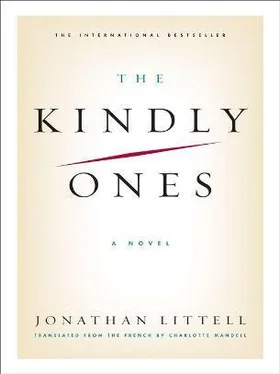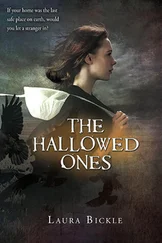Beyond lay the Tiergarten. I left the road and dove into the trees. Aside from the whirring of flying mortar shells and distant explosions, the park was strangely silent. The Nebelkrähe , those hooded crows whose hoarse cries always resound through the Tiergarten, had all left, fleeing the constant shelling for a safer place: no Sperrkommando in the sky, no flying court-martial for birds. How lucky they are, and they don’t even know it. Corpses sprawled among the trees; and all along the pathways, sinister, swayed the hanged. It began to rain again, a light rain through which the sun still shone. The bushes in the flowerbeds had blossomed, the smell of rose bushes mingled with that of corpses. From time to time I turned around: between the trees, I seemed to glimpse the silhouette following me. A dead soldier was still holding his Schmeisser; I grabbed it, aimed it at the silhouette, pulled the trigger; but the weapon was jammed and I threw it furiously into a bush. I had hoped not to stray too far from the main road, but on that side I saw movement, vehicles, and I moved deeper into the park. To my right, the Victory Column rose above the trees, hidden by its protective coverings and still obstinately standing. In front of me several pools of water blocked the path: instead of heading back toward the road, I decided to skirt round them toward the canal, where I used to go, a very long time ago, prowling the night in search of pleasure. From there, I said to myself, I’ll cut through the zoo and go lose myself in Charlottenburg. I crossed the canal over the bridge where I had had that curious altercation with Hans P., one night. Beyond, the wall of the zoo had collapsed in several places, and I climbed up over the rubble. Sustained fire came from the large bunker, light cannon shots and machine-gun volleys.
This part of the zoo was completely flooded: the bombardments had ripped open the Aquarium and the fish tanks had burst, pouring out tons of water, strewing the lanes with dead fish, crayfish, crocodiles, jellyfish, a panting dolphin that, lying on its side, contemplated me with a worried eye. I waded forward, around the baboon island where babies clutched with minuscule hands the stomachs of their panicking mothers, I wove between parrots, dead monkeys, a giraffe whose long neck hung over a railing, bleeding bears. I entered a half-destroyed building: in a large cage, an immense black gorilla was sitting, dead, a bayonet stuck in its chest. A river of black blood flowed between the bars and mingled with the pools of water. This gorilla looked surprised, astonished; its wrinkled face, its open eyes, its enormous hands, seemed frighteningly human to me, as if it were on the point of talking to me. Beyond this building stretched a long enclosed pond: a hippopotamus was floating in the water, dead, the fin of a mortar shell stuck in its back; another one was lying on a platform, riddled with shrapnel, dying in long, heavy gasps. The water overflowing from the pool was soaking the clothes of two Waffen-SS lying there; a third one rested, leaning against a cage, his eyes blank, his machine gun across his legs. I wanted to go on but I heard bursts of Russian voices, mixed with the trumpeting of a panic-stricken elephant. I hid behind a bush and then turned back to go around the cages across a kind of little bridge. Clemens barred my path, his feet in a puddle at the end of the footbridge, his wet hat still dripping with rainwater, his automatic in his hand. I raised my hands, as in the movies. “You made me run,” Clemens panted. “Weser is dead. But I got you.”—“Kriminalkommissar Clemens,” I hissed, out of breath from running, “don’t be ridiculous. The Russians are a hundred meters away. They’ll hear your gunshot.”—“I should drown you in a pool, you piece of shit,” he belched, “sew you up in a bag and drown you. But I don’t have time.”—“You haven’t even shaved, Kriminalkommissar Clemens,” I bellowed, “and you want to pass judgment on me!” He gave an abrupt laugh. A gunshot rang out, his hat came down over his face, and he fell like a block across the bridge, his head in a puddle of water. Thomas stepped out from behind a cage, a carbine in his hands, a large, delighted smile on his lips. “As usual, I arrive just in time,” he said happily. He glanced at Clemens’s massive body. “What did he want with you?”—“He was one of those two cops. He wanted to kill me.”—“Stubborn guy. Still for the same business?”—“Yes. I don’t know, they’ve gone mad.”—“You haven’t been very smart, either,” he said to me severely. “They’re looking for you everywhere. Müller is furious.” I shrugged and looked around. It had stopped raining, the sun shone through the clouds and made the wet leaves on the trees and the patches of water in the lanes glisten. I could still make out a few scraps of Russian voices: they must have moved a little farther off, behind the monkey enclosure. The elephant trumpeted again. Thomas, his carbine leaning on the railing of the little bridge, had crouched down next to Clemens’s body; he had pocketed the policeman’s automatic and was rummaging through his clothes. I passed behind him and looked to that side, but there was no one. Thomas had turned toward me and was waving a thick wad of reichsmarks: “Look at that,” he said, laughing. “A gold mine, your cop.” He put the bills in his pocket and kept searching. Next to him, I saw a thick iron bar, torn from a nearby cage by an explosion. I picked it up, weighed it, then brought it down with all my strength on the nape of Thomas’s neck. I heard his vertebrae crack and he toppled over like a log, across Clemens’s body. I dropped the bar and contemplated the bodies. Then I turned Thomas over, his eyes were still open, and unbuttoned his tunic. I undid my own and quickly switched jackets with him before turning him onto his stomach again. I inspected the pockets: along with the automatic and Clemens’s banknotes were Thomas’s papers, those of the Frenchman from the STO, and some cigarettes. I found the keys to his house in his pants pocket; my own papers had stayed in my jacket.
The Russians had moved farther on. In the lane a little elephant came trotting toward me, followed by three chimpanzees and an ocelot. They went around the bodies and over the bridge without slowing down, leaving me alone. I was feverish, my mind was coming apart. But I still remember perfectly the two bodies lying on top of each other in the puddles, on the footbridge, and the animals moving off. I was sad but didn’t really know why. I felt all at once the entire weight of the past, of the pain of life and of inalterable memory, I remained alone with the dying hippopotamus, a few ostriches, and the corpses, alone with time and grief and the sorrow of remembering, the cruelty of my existence and of my death still to come. The Kindly Ones were on to me.
AA ( Auswärtiges Amt , “Department of the Exterior”): Foreign Office, headed by Joachim von Ribbentrop.
ABWEHR: Military intelligence service. Its full name was Amt Ausland/Abwehr im Oberkommando der Wehrmacht , “Foreign Office/Defense for the Armed Forces High Command.”
AMT: Office.
ARBEITSEINSATZ ( “work operation” ): Department in charge of organizing forced labor of inmates in concentration camps.
AOK ( Armeeoberkommando ): The headquarters of an army, which controlled a certain number of divisions. At all levels (Army, Division, Regiment, etc.), the organization of military headquarters included, among other things, a Chief of Staff; a Ia (pronounced “One-a,” “Eins-a,” in German), the general officer in charge of operations; a Ib ( Eins-b ) or quartermaster in charge of supplies; and a Ic/AO ( Eins-c/AO ), the officer in charge of military intelligence, or Abwehroffizier .
Читать дальше










